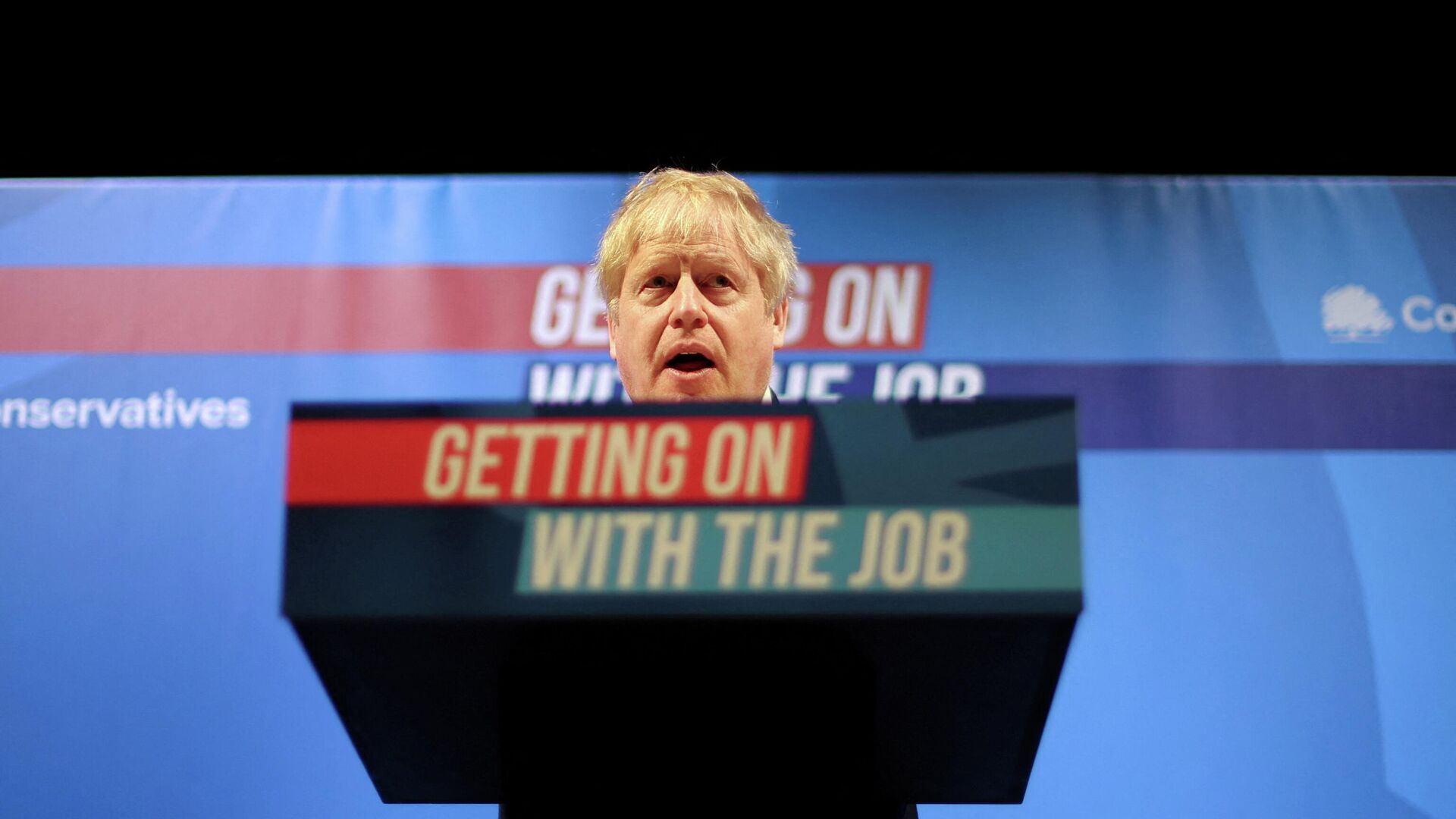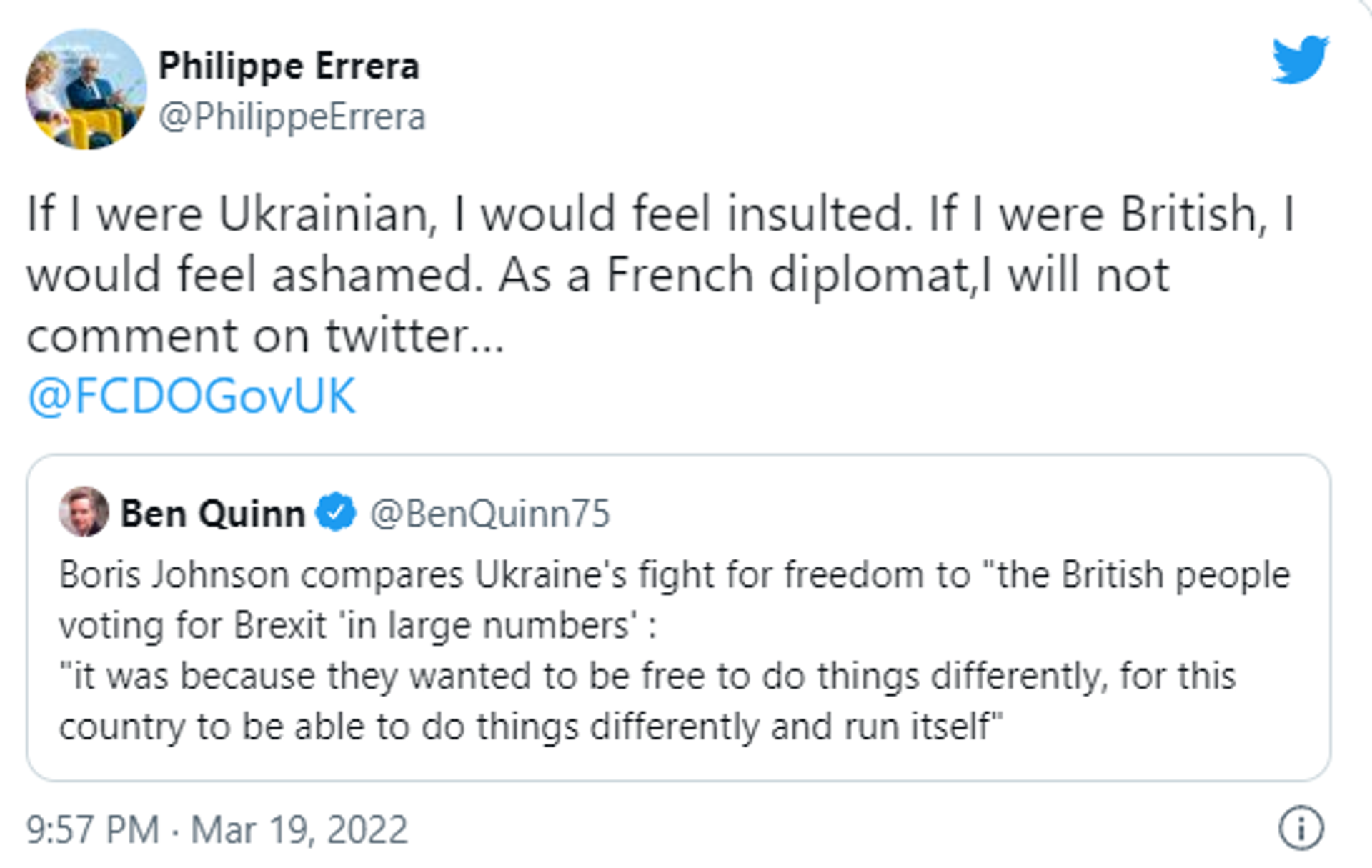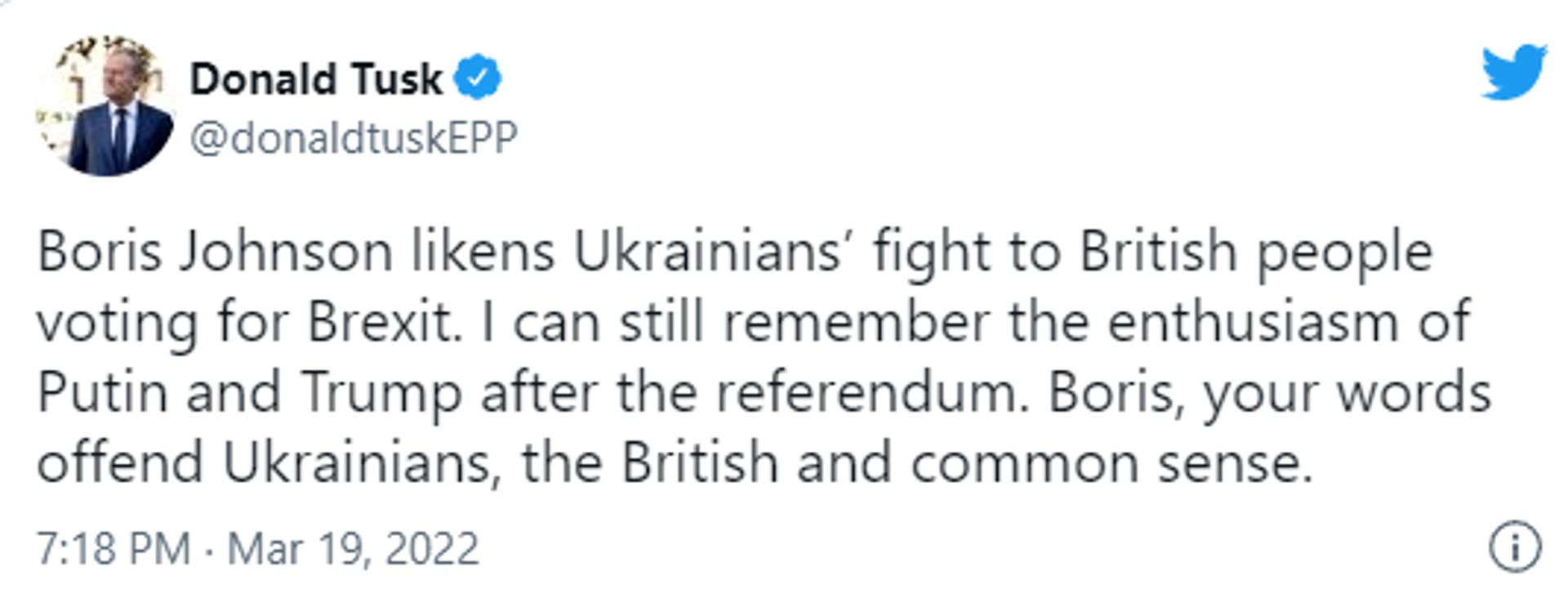https://sputnikglobe.com/20220320/boris-johnson-under-fire-after-comparing-ukrainian-crisis-to-brexit-vote-1094028285.html
Boris Johnson Under Fire After Comparing Ukrainian Crisis to Brexit Vote
Boris Johnson Under Fire After Comparing Ukrainian Crisis to Brexit Vote
Sputnik International
The United Kingdom is among those nations in the West actively sending military aid to Ukraine amid the country's ongoing conflict with Russia. At the same... 20.03.2022, Sputnik International
2022-03-20T12:17+0000
2022-03-20T12:17+0000
2025-04-07T11:00+0000
boris johnson
ukraine
united kingdom (uk)
viral news
https://cdn1.img.sputnikglobe.com/img/07e6/03/14/1094029255_0:160:3073:1888_1920x0_80_0_0_b54461268968935cbe85bfa101999a8e.jpg
UK Prime Minister Boris Johnson has found himself in hot water after a recent speech at the Conservative Spring Conference in Blackpool, where he happened to compare Ukraine's resistance to the special Russian military operation in the country to the Brexit vote in 2016.The "recent example" did not appear to resonate with many critics, among them former European Council President Donald Tusk, senior backbench Tory Tobias Ellwood, and even several French diplomats.Political director at the French Foreign Ministry Philippe Errera weighed in on Johnson's remarks, followed by French Ambassador to the UK Catherine Colonna. "As the French Ambassador in the UK, I will not either", Colonna said after Errera said he would not "comment on Twitter".Ex-chief of staff at Number 10 Lord Barwell, commenting on Johnson's comparison, said that "voting in a free and fair referendum isn't in any way comparable with risking your life to defend your country against invasion".Others, however, weighed in to defend the prime minister's remarks. Among them was Chancellor Rishi Sunak, who said he did not think "the prime minister was saying that they [the Ukrainian crisis and the Brexit vote] were directly analogous". He also said that people "will draw their own conclusions".Boris Johnson himself has not yet addressed the backlash that followed his comments.The United Kingdom voted to leave the European Union in 2016, with Brexit officially occurring on the night from 31 January to 1 February 2020. Britons voted to leave the EU by 52% to 48%, according to the BBC.The conflict in Ukraine, for its part, has been underway since 24 February, when Russia launched a special military operation to "demilitarise and de-Nazify" Ukraine. The Kremlin said it does not plan to occupy the country, nor are Russian troops targeting civilians, focusing exclusively on Ukrainian military infrastructure, according to the Russian Defence Ministry. Nations in the West - among them the United Kingdom - have condemned the operation and imposed harsh anti-Russian sanctions.Let's stay in touch no matter what! Follow our Telegram channel to get all the latest news: https://t.me/sputniknewsus
ukraine
united kingdom (uk)
Sputnik International
feedback@sputniknews.com
+74956456601
MIA „Rossiya Segodnya“
2022
Sputnik International
feedback@sputniknews.com
+74956456601
MIA „Rossiya Segodnya“
News
en_EN
Sputnik International
feedback@sputniknews.com
+74956456601
MIA „Rossiya Segodnya“
Sputnik International
feedback@sputniknews.com
+74956456601
MIA „Rossiya Segodnya“
boris johnson, ukraine, united kingdom (uk), viral news
boris johnson, ukraine, united kingdom (uk), viral news
Boris Johnson Under Fire After Comparing Ukrainian Crisis to Brexit Vote
12:17 GMT 20.03.2022 (Updated: 11:00 GMT 07.04.2025) The United Kingdom is among those nations in the West actively sending military aid to Ukraine amid the country's ongoing conflict with Russia. At the same time, Prime Minister Boris Johnson doesn't appear to enjoy unilateral public support: polls show that a majority of British citizens want him to resign.
UK Prime Minister Boris Johnson has found himself in hot water after a recent speech at the Conservative Spring Conference in Blackpool, where he happened to compare Ukraine's resistance to the special Russian military operation in the country to the Brexit vote in 2016.
"I know that it's the instinct of the people of this country, like the people of Ukraine, to choose freedom, every time", Johnson said, addressing Saturday's event. "I can give you a couple of famous recent examples. When the British people voted for Brexit in such large, large numbers, I don't believe it was because they were remotely hostile to foreigners. It's because they wanted to be free to do things differently and for this country to be able to run itself".
The "recent example" did not appear to resonate with many critics, among them former European Council President Donald Tusk, senior backbench Tory Tobias Ellwood, and even several French diplomats.
Political director at the French Foreign Ministry Philippe Errera weighed in on Johnson's remarks, followed by French Ambassador to the UK Catherine Colonna.
"As the French Ambassador in the UK, I will not either", Colonna said after Errera said he would not "comment on Twitter".
Ex-chief of staff at Number 10 Lord Barwell, commenting on Johnson's comparison, said that "voting in a free and fair referendum isn't in any way comparable with risking your life to defend your country against invasion".
"[Additionally,] the awkward fact the Ukrainians are fighting for the freedom to join the EU, this comparison is bang on", Barwell continued.
Others, however, weighed in to defend the prime minister's remarks. Among them was Chancellor Rishi Sunak, who said he did not think "the prime minister was saying that they [the Ukrainian crisis and the Brexit vote] were directly analogous". He also said that people "will draw their own conclusions".
"I don't think it is as big a deal as some people are making out", a fellow Tory MP, Robert Halfon, told BBC Breakfast. "The way I see it is the prime minister was saying we're a vibrant democracy. We're such a vibrant democracy, we've had a referendum. Ukraine wants to be a vibrant democracy and the Russians are trying to stop that".
Boris Johnson himself has not yet addressed the backlash that followed his comments.
The United Kingdom voted to leave the European Union in 2016, with Brexit officially occurring on the night from 31 January to 1 February 2020. Britons voted to leave the EU by 52% to 48%, according to the BBC.
The
conflict in Ukraine, for its part, has been underway since 24 February, when Russia launched a special military operation to "demilitarise and de-Nazify" Ukraine. The Kremlin said it does not plan to occupy the country, nor are Russian troops targeting civilians, focusing exclusively on Ukrainian military infrastructure, according to the Russian Defence Ministry. Nations in the West - among them the United Kingdom - have condemned the operation and imposed harsh anti-Russian sanctions.
Let's stay in touch no matter what! Follow our Telegram channel to get all the latest news: https://t.me/sputniknewsus 


